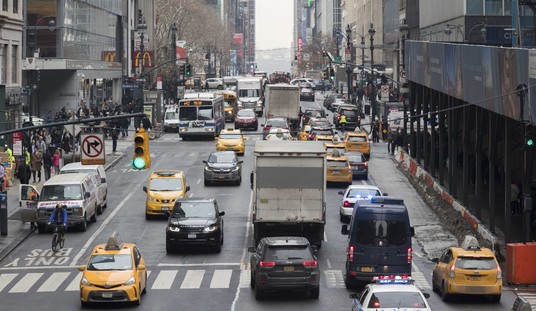In the rush to declare the war in Afghanistan over, the White House has made the uncomfortable discovery that … it isn’t. According to the Washington Post’s Missy Ryan, the plans for a full withdrawal from the theater has hit enough snags on the ground that it may get delayed — for the second time:
The Obama administration is considering slowing its planned withdrawal from Afghanistan for the second time, according to U.S. officials, a sign of the significant security challenges that remain despite an end to the U.S. and NATO combat mission there.
Under the still-evolving plans, Army Gen. John F. Campbell, the commander of U.S. and NATO forces in Afghanistan, could be given greater latitude to determine the pace of the drawdown in 2015 as foreign forces scramble to ensure Afghan troops are capable of battling Taliban insurgents on their own, the officials said.
The options under discussion would not alter what is perhaps the most important date in President Obama’s plan: ending the U.S. military mission entirely by the time he steps down in early 2017.
But officials said Campbell might temporarily retain more than the 5,500 troops slated to remain in Afghanistan at the end of 2015, keep regional training hubs open longer than planned or reorganize plans to close bases including Kandahar Airfield, a major endeavor that would draw troops away from efforts to advise Afghan security forces.
No military plan survives its first contact with reality intact, but this particular plan has always had more problems with reality than most. Initially, Obama wanted a full withdrawal by the end of last year in order to declare victory and claim that he’d ended two wars. By last September, even while claiming to have turned Somalia and Yemen into success stories, the White House awoke to the fact that they hadn’t even ended one, and a pullout would make Iraq’s collapse look like a campus debate. Obama finally agreed to keep 9800 troops in combat-ready positions through the end of 2014, with the plan to reduce those numbers throughout 2015 and 2016. Other NATO members followed suit.
Not surprisingly, the prospects for victory declarations haven’t improved much in five months. The rise of ISIS in Iraq and Syria, and the need to have assets in place to fight it, has many wondering why we’d leave a vacuum behind in Afghanistan. The former CIA station chief in Islamabad wonders about that too:
Afghanistan is in danger of turning into a sanctuary once again for Islamist extremists as the West withdraws troops and shifts its attention elsewhere, a former senior CIA official warned.
The country could even become a refuge for Islamic State jihadists now waging war in Syria and Iraq, said Robert Grenier, the former Central Intelligence Agency station chief in Islamabad and author of a new book.
His memoir, “88 Days to Kandahar,” recounts his harrowing experience helping to topple the Taliban regime in Afghanistan in 2001 after the September 11 attacks
“I would say if anything the future threat of an Afghan safe haven is maybe even greater than it was back before 9/11,” Grenier said at an event organized by the New America think tank.
Ryan’s sources in the White House say they are still committed to the withdrawal before Obama leaves office. The worse the war goes against ISIS, though, and the more resilient the Taliban remain, it won’t be difficult to connect the dots and see a horrid picture forming in the wake of Western withdrawal. We left a vacuum in Iraq that got filled with al-Qaeda-affiliated radicals, most of whom weren’t native. Imagine what it will be like when we leave the door open for native Pashtuns and their Taliban leadership — and all of their allies.
Don’t look now, but China’s getting ready to fill the vacuum left by the US in Afghanistan:
This might be good news. If the US and the West are determined to leave Afghanistan before its government can secure itself and build this kind of infrastructure, then there would be worse outcomes than having the Chinese take over that role. They’re a lot closer, and Afghanistan is much more strategic for them than for us. However, if they do fill that vacuum and the Taliban once again take part in international terrorism against the West, then it will be a much bigger problem for the West to retaliate if China has Afghanistan in its grip.








Join the conversation as a VIP Member